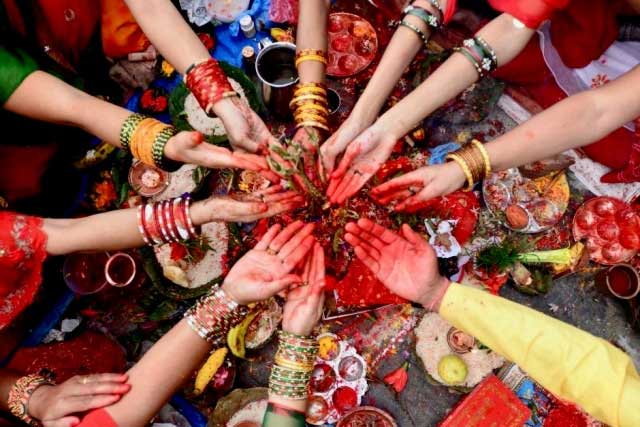
Rishi Panchami Festival Celebrated with Worship of Arundhati and Saptarishis
Rishi Panchami, a significant festival for Nepali women, is observed annually on Bhadra Shukla Panchami. Women begin their day early, performing traditional rituals and heading to rivers, lakes, or ponds for purification. Using 365 pieces of the medicinal herb "dattiwan," they clean their teeth and take a cleansing bath using cow dung, soil, and ash.
Significance of Rishi Panchami for Women
According to religious texts, while both men and women can participate in Haritalika (Teej), Rishi Panchami is specifically for women. Professor Dr. Devmani Bhattarai, a scholar and member of Nepal’s Panchang Determination Development Committee, explains that this festival allows women to purify themselves from any impurities related to menstruation. Bathing with the medicinal herb, cow dung, soil, and ash, followed by the consumption of Panchagavya (five cow products), is believed to absolve any impurities.
Rituals and Worship on Rishi Panchami
Women worship Arundhati alongside the seven sages (Atri, Gautam, Bharadvaja, Jamadagni, Vashishta, Kashyapa, and Vishwamitra) after their ritual bath. This worship, known as Rishi Panchami Puja, is central to the day. As it involves the Saptarishis, the day is called Rishi Panchami.
Religious Beliefs and Legends
A popular legend links Rishi Panchami to menstruation. In ancient times, Lord Indra faced the consequences of Brahmahatya (killing a Brahmin) after beheading Vishvarupa. To relieve Indra from this sin, Brahma scattered the burden of the sin across the earth, trees, water, and women. It is believed that the origin of infertile land, tree sap, water bubbles, and menstruation in women stems from this legend, as shared by Pandit Madhusudan Subedi, a spiritual author.
Women are discouraged from contact during menstruation due to the belief that their bodies release germs that could cause diseases. If contact occurs, women can cleanse themselves of this sin by worshiping Arundhati and the Saptarishis during Rishi Panchami.
Health and Cultural Perspectives
Menstruation is viewed as an impure time, and avoiding contact with others is seen as beneficial for health. Modern health research has validated this belief, incorporating it into societal norms. Pandit Subedi stresses the need for further scientific research and awareness regarding this practice.
Traditional Fasting and Meals
After completing their rituals and worship, women observe a one-meal fasting ritual (Havishya). They consume simple, naturally grown foods like sama (millet), kaguno, root vegetables, and karkala (water spinach).
Devotees Gather for Worship
Across the country, women devotees gather at Risheshwar temples, including Teku and Mulpani in Kathmandu, to perform prayers and worship Arundhati and the Saptarishis. Those unable to visit temples carry out their rituals and worship at riverbanks or in their homes.
Festival

